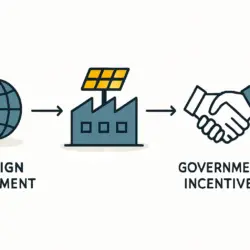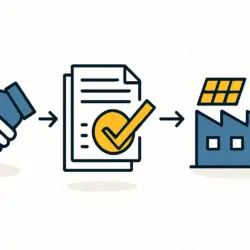Taiwan is bolstering its energy security by increasing its strategic oil reserves and enhancing the storage capacity of its power plants. President Tsai Ing-wen announced during a visit to the 4th Liquefied Natural Gas (LNG) Terminal in Taichung that this initiative is a critical part of a multi-faceted strategy to strengthen the country’s resilience against potential disruptions, particularly in light of the ongoing existential threat from Beijing.
Enhancing Oil and Gas Reserves for Taiwan energy security
Taiwan is taking proactive measures to increase its strategic oil reserves. The country is expanding its oil storage capacity with the goal of withstanding supply disruptions for a full 180 days. This initiative is designed to enhance Taiwan’s energy security by building deep resilience against geopolitical risks, such as a potential blockade, and natural disasters. By strategically increasing its oil and gas reserves, Taiwan is reinforcing its ability to maintain crucial energy supplies during times of crisis.
Addressing the persistent threat from China, President Tsai emphasized that the government is committed to safeguarding the stability of natural gas supplies and preventing power shortages. This includes broadening LNG supply options and strengthening international partnerships. A key element of this is seeking support through legislation like the proposed Taiwan Energy Security and Anti-Embargo Act in the U.S., which aims to facilitate increased American LNG exports to the island.
The new LNG terminal is set to play a crucial role in this strategy. Once fully operational, it will increase the energy reserve capacity of the Taichung Power Plant to 15 days. This enhancement is part of a broader effort to ensure that Taiwan can maintain uninterrupted energy supplies even when facing external threats.
Reducing Coal Dependence for Taiwan energy security
In addition to boosting energy reserves, the LNG terminal will contribute significantly to reducing Taiwan’s reliance on coal power. The government has set an ambitious target to reduce the share of coal in the energy mix to 30% by 2025. This transition to cleaner energy sources, including natural gas and renewables, is aimed at cutting carbon emissions and improving air quality. The shift also diversifies the energy portfolio, making it less vulnerable to disruptions in a single fuel source.
The new LNG terminal in Taichung is a cornerstone of Taiwan’s strategy to diversify its energy sources. This move away from coal is part of a larger energy transition that includes scaling up renewable capacity. For Taiwan, building a robust solar industry is a key component, requiring a deep understanding of everything from the basics of solar panel manufacturing to the complete solar panel manufacturing process. By reducing dependence on coal, the government aims to create a more sustainable and resilient energy system that can better withstand external pressures.
President Tsai’s visit to the LNG terminal underscores the importance of energy security in Taiwan’s national strategy. By focusing on increasing strategic reserves and diversifying energy sources, Taiwan is taking concrete steps to ensure its energy stability.
Strengthening Infrastructure for Taiwan energy security
Taiwan is not only increasing its energy reserves but also strengthening its overall energy infrastructure against both physical and cyber threats. The expansion of strategic oil reserves and the development of LNG facilities are part of a comprehensive plan to enhance the country’s energy resilience. This also involves securing the digital backbone of the energy grid.
These efforts are designed to protect Taiwan’s energy supplies from potential disruptions, including those posed by natural disasters or geopolitical tensions. Recognizing that modern threats are increasingly digital, Taiwan is also amending its Cybersecurity Management Act. These updates mandate the appointment of Chief Information Security Officers (CISOs) and other dedicated personnel to protect critical infrastructure. By building a more robust and secure energy infrastructure, Taiwan is better positioned to weather any challenges that may arise.
Government Commitment to Taiwan energy security
The government’s commitment to security is evident in its proactive, whole-of-government approach. This extends beyond energy to include a significant boost in defense spending, with plans to reach 5% of GDP by 2030 to counter China’s military pressure. President Tsai’s announcement highlights how energy initiatives are integrated into this larger national security framework.
As Taiwan continues to face external threats, the government remains focused on strengthening its defenses on all fronts. By increasing strategic reserves, reducing dependence on coal, and hardening its critical infrastructure against cyberattacks, Taiwan is building a more resilient nation capable of withstanding future challenges. This comprehensive strategy demonstrates a clear-eyed understanding of the interconnected nature of energy, economic, and national security.
To learn more about how countries are building their renewable energy capacity, explore our detailed guides and reports. You can start with our free e-course on the essentials of solar energy production.



